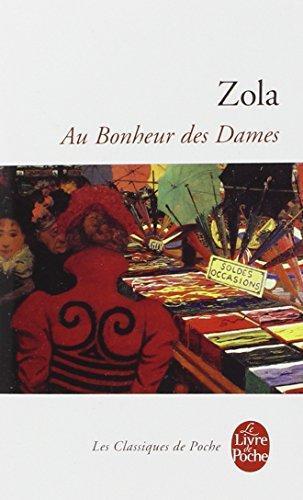534 pages
French language
Published May 11, 1971

534 pages
French language
Published May 11, 1971
Au Bonheur des Damescode: fra promoted to code: fr (French pronunciation: [obɔnœʁ deˈdam]; The Ladies' Delight or The Ladies' Paradise) is the eleventh novel in the Rougon-Macquart series by Émile Zola. It was first serialized in the periodical Gil Blas from December 17, 1882 to March 1, 1883; and published in novel form by Charpentier in 1883. The novel is set in the world of the department store, an innovative development in mid-nineteenth century retail sales. Zola models his store after Le Bon Marché, which consolidated under one roof many of the goods hitherto sold in separate shops. The narrative details many of Le Bon Marché's innovations, including its mail-order business, its system of commissions, its in-house staff commissary, and its methods of receiving and retailing goods. Au Bonheur des Damescode: fra promoted to code: fr is a sequel to Pot-Bouille. Like its predecessor, Au Bonheur des Damescode: fra promoted …
Au Bonheur des Damescode: fra promoted to code: fr (French pronunciation: [obɔnœʁ deˈdam]; The Ladies' Delight or The Ladies' Paradise) is the eleventh novel in the Rougon-Macquart series by Émile Zola. It was first serialized in the periodical Gil Blas from December 17, 1882 to March 1, 1883; and published in novel form by Charpentier in 1883. The novel is set in the world of the department store, an innovative development in mid-nineteenth century retail sales. Zola models his store after Le Bon Marché, which consolidated under one roof many of the goods hitherto sold in separate shops. The narrative details many of Le Bon Marché's innovations, including its mail-order business, its system of commissions, its in-house staff commissary, and its methods of receiving and retailing goods. Au Bonheur des Damescode: fra promoted to code: fr is a sequel to Pot-Bouille. Like its predecessor, Au Bonheur des Damescode: fra promoted to code: fr focuses on Octave Mouret, who at the end of the previous novel married Caroline Hédouin, the owner of a small silk shop. Now a widower, Octave has expanded the business into an international retail powerhouse occupying, at the beginning of the book, the greater part of an entire city block.